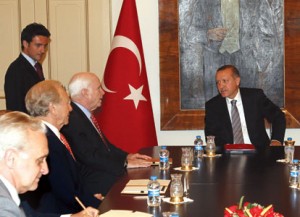Special to WorldTribune.com
WASHINGTON — The United States has determined that the Sunni revolt
in Syria was threatened by a shortage of money and weapons.
Officials said the administration of President Barack Obama and Congress
have been told that Sunni rebels were not receiving aid promised by Gulf
Cooperation Council and other countries. They said the lack of a clear
command structure in the Free Syrian Army has also hampered Washington’s
efforts to help the opposition to Syrian President Bashar Assad.

“The most stunning, unsettling conclusion I drew from the leaders of the Free Syrian Army was that they have essentially got no help from anyone,” Sen. Joseph Lieberman said. “They are literally running out of ammunition while Assad’s forces are being re-supplied by Iran and Russia.”
Lieberman and Sen. John McCain recently met FSA leaders as
well as other members of the Syrian opposition along the Turkish border with Syria. In one meeting, the FSA commanders urged Washington to supply anti-aircraft systems to halt strikes by Syrian Air Force Mi-24 attack helicopters.
Officials acknowledged that FSA and the rest of the Sunni revolt were
unable to respond to what appeared to be a rearming of Assad’s forces by China, Iran and Russia. They said the FSA leadership has complained of a slowdown in weapons supplies as well as cash transfers from Gulf Cooperation Council states.
“We are at a crucial turning point,” Secretary of State Hillary Clinton said on April 18.
McCain and Lieberman said the international community was awaiting U.S.
leadership on Syria. In an assertion confirmed by officials of the
administration of President Barack Obama, the two senators cited Turkish
willingness to help the Sunni revolt along with full cooperation by
Washington.
“They are all waiting for the U.S. to say ‘We’re in this,’ ” Lieberman
told the Washington news site The Cable.
Michael Knights, a researcher with the Washington Institute for Near
East Policy, said GCC states were awaiting a U.S. or NATO campaign against
Assad. Knights suggested that even Syria’s pro-U.S. neighbors, including
Jordan and Turkey, were not committed to ousting Assad.
“Lethal [GCC] aid would also probably remain indirect and low volume —
small pots of Gulf money given to Lebanese and Iraqi arms smugglers — until
either the United States or France provides anti-tank weapons, secure
communications equipment, and other vital resources,” Knights said in a
report titled “Could the Gulf States Intervene in Syria?” said.
Still, eight months after the administration called for Assad to step
down, Washington has not formulated guidelines on regime change in Syria.
Officials said the failure reflected a determination by the White House to
avoid U.S. military intervention or confrontation with Iran, Assad’s leading
ally.
“One way or another this regime will ultimately meet its end,” Defense
Secretary Leon Panetta said on April 19. “There are legitimate questions
about what steps are necessary to achieve this end, with some arguing for an
approach similar to the one we took in Libya.”

You must be logged in to post a comment Login